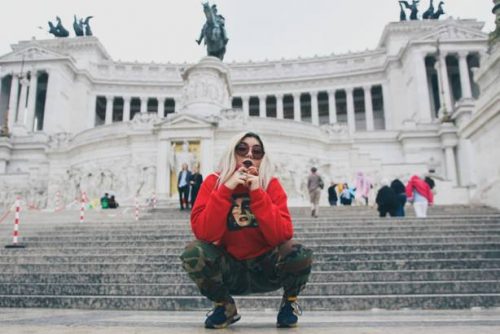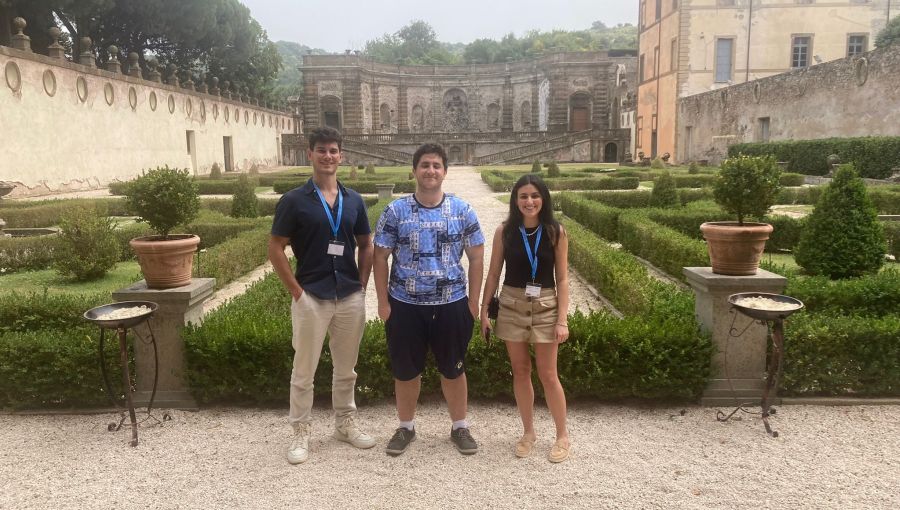Art About Food: Alumna Kiriko Mechanicus
Born and raised in Amsterdam, the Netherlands, alumna Kiriko Mechanicus graduated from JCU in 2018 with a B.A. in History and a Minor in Communications. Kiriko is currently studying documentary filmmaking at the Netherlands Film Academy. She was recently invited to write and recite a Dutch-Italian poem in an event in honor of the Dutch state visit of Italian President Sergio Mattarella for the 30-year anniversary celebrations of the Treaty of Maastricht.

Kiriko in Rome
Tell us about your background.
I always dreamed of moving to Italy and studying history there. Upon turning 18, I moved to Rome with little or no plans, and ended up at JCU after half a year of roaming around. The University gave me the opportunity to combine many of my interests: I started focusing a lot of my historical research on the history of food, and I was also doing a cinema-based Communications minor. It was at that moment that I understood that I wanted to dedicate my life to reaching a better understanding of food and the way we talk about it.
How’s life after graduation? What have you been up to?
After obtaining my B.A. from JCU, I moved back to Amsterdam where I continued my education at the Dutch Film Academy. I am studying documentary filmmaking and will be graduating this year, with a film about tomato pickers in the South of Italy. They are mostly people who fled from their home country to Europe in search of a brighter future but got stuck in the tomato fields. The film will be released this June. Alongside my studies, I’m a culinary writer for various Dutch platforms.
Tell us about your participation in the event for the Dutch state visit of Italian President Sergio Mattarella.
I had the incredible honor of opening the visit of President Mattarella in the Netherlands, where he gave a speech to commemorate the 30-year anniversary of the Treaty of Maastricht, when the European Union was formed. I was asked to write and recite a poem for the occasion.
The poem that I wrote was a dialogue between a Dutch woman and an Italian tomato picker who attempted a conversation on a tomato field. The tomato is a fruit that is a result of a “marriage” between Italy and the Netherlands: most Italian tomatoes are grown from Dutch seeds but need the Mediterranean soil to grow. It is a marriage that brings forth a sweet and cherishable fruit but comes forth from a poisonous plant. It is the same way I view Europe: a young fruit with lots of potential, but a fruit that has to detach itself from its destructive past.
You’re also a freelance documentary filmmaker. What is your source of inspiration? How would you characterize your film style, projects, and artistic expression?
I use food as a means to get a better understanding of life. How, what, when, and with whom we eat is a language in and of itself based on flavors, colors, and techniques that have been developed (mostly by women!) over centuries in our homes. Food reveals our history and identity in a sensory way, a way that words will never be able to explain. I love this. I hope to spend the rest of my life thinking and creating art about food. Italy has also left a huge impression on me. I’ve learned to love life in Italy, which I attempted to capture in the music video PANTEA that I directed two years ago for Italian producer Lorenzo BITW.
How has studying history at JCU inspired your creative work? What classes and/or professors impacted you the most and why?
I think understanding one’s history is fruitful for anyone. The History Department at JCU consists of brilliant storytellers, who have taught me the importance of perspective and narrative. Telling a great story is just as important in history as in the arts. JCU is also the place where I learned to love cinema. It was especially in the classes of Professors Tijana Mamula and Marco Ferrari that all notions of narrative arcs were broken to pieces and re-established!
What are your plans for the future?
Become more empathic, curious, and open in everything I do and make.





